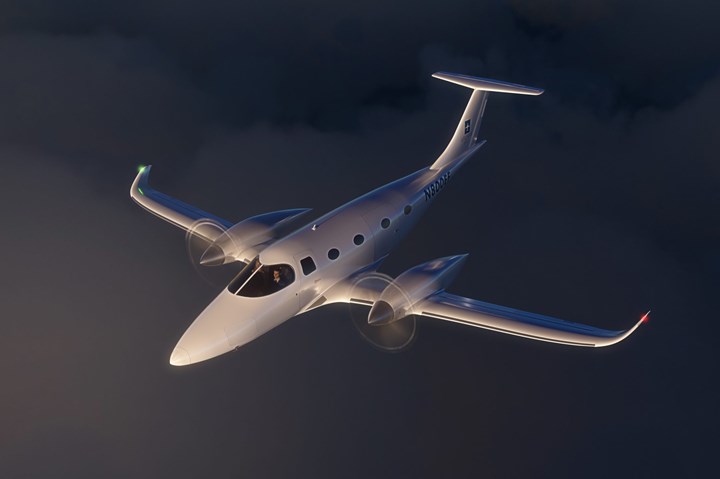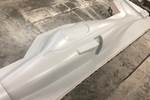Bye Aerospace unveils eight-seat all-electric eFlyer 800
Taking advantage of advanced materials, the aircraft reportedly eliminates all CO2 emissions and is only one-fifth the operating costs of traditional twin turboprops.

Bye Aerospace eFlyer 800 rendition. Photo Credit: Bye Aerospace
On April 22 Bye Aerospace (Denver, Colo., U.S.) introduced its eight-seat all-electric twin turboprop class airplane, the eFlyer 800, in response to growing demands for regional all-electric airplanes with significantly reduced operating costs, plus increased capacity and utility. Likely to take advantage of composite materials, this aircraft is also to be modified for a multi-mission version for aerospace and defense company L3Harris Technologies.
Performance estimates for the eFlyer 800 include up to 320 knot cruise speed, 35,000 feet ceiling and 500 nautical mile range with 45-minute IFR (instrument flight rules) reserves at normal cruise speed of 280 knots. Safety features include two wing-mounted electric motors, each with dual redundant motor windings, quad-redundant battery packs and a full airplane parachute. Additional potential features include emergency auto-landing system, intelligent algorithm ensuring envelope protection, terrain avoidance and routing for emergency auto-land, and also an option for supplemental power solar cells and in-wheel electric taxi. The airplane’s eight-seat configuration consists of up to seven passengers and one or two pilots. The eFlyer 800 will have only one-fifth the operating costs of traditional twin turboprops and is geared for the air-taxi, air-cargo, regional and charter aircraft markets.
“The eFlyer 800 is the first all-electric propulsion technology airplane that achieves twin-turboprop performance and safety with no CO2 and extremely low operating costs,” says George E. Bye, Bye Aerospace CEO. “This type of remarkable economy and performance is made possible by the electric propulsion system and advanced battery cell technology that results in significantly higher energy densities.”
Bye Aerospace and Safran (Paris, France) are currently assessing the most efficient electric powertrain for the eFlyer 800 (dual ENGINeUS electric motors and GENeUSGRID electric distribution and network protection system). “Safran product lines with the ENGINeUS motors, rated from 50 kilowatts to 500 kilowatts per 1 megawatt, and GENeUSGRID systems, perfectly fit with the Bye Aerospace portfolio of e-aircraft,” says Hervé Blanc, executive vice president and general manager of Power with Safran Electrical & Power. “Building upon our successful cooperation on eFlyer2 and eFlyer4, we are very proud to bring our best expertise to support Bye Aerospace in the design of the new eFlyer 800.”
Bye says eFlyer 800 customer deposit agreements are complete, and several are being developed with U.S. and European air-taxi, air-cargo and air charter services. “Details about those agreements will be announced soon, and as they are finalized,” he notes.
Further, Bye Aerospace is in the process of obtaining FAA Part-23 certification for the eFlyer 2 for the professional flight training mission and the four-seat eFlyer 4 for air taxi, cargo and advanced training uses. All the company’s current and future families of aircraft feature engineering, research and electric aircraft solutions designed to specifically address compelling market needs. Benefits include five-fold lower operating costs, no CO2 emissions and decreased noise. Bye Aerospace estimates the eFlyer will eventually eliminate the release of millions of metric tons of CO2 each year as its deliveries begin and the general aviation fleet is replaced.
Related Content
-
Manufacturing the MFFD thermoplastic composite fuselage
Demonstrator’s upper, lower shells and assembly prove materials and new processes for lighter, cheaper and more sustainable high-rate future aircraft.
-
Plant tour: Albany Engineered Composites, Rochester, N.H., U.S.
Efficient, high-quality, well-controlled composites manufacturing at volume is the mantra for this 3D weaving specialist.
-
Plant tour: Spirit AeroSystems, Belfast, Northern Ireland, U.K.
Purpose-built facility employs resin transfer infusion (RTI) and assembly technology to manufacture today’s composite A220 wings, and prepares for future new programs and production ramp-ups.
















